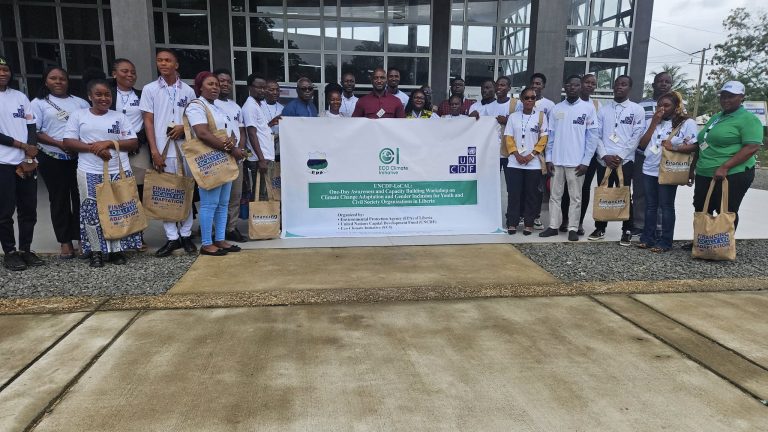Posts Categories
Latest Posts

Paynesville, Liberia – September 25, 2025 – The Environmental Protection Agency (EPA) of Liberia on Wednesday, September 24, 2025, successfully concluded a one-day awareness and capacity-building workshop aimed at empowering youth and civil society organizations (CSOs) to actively participate in climate change adaptation and gender inclusion initiatives.
The event, held at the Liberia Learning Center, Empower Square, Paynesville, was organized with support from the United Nations Capital Development Fund (UNCDF) and Eco Climate Initiative (ECI). It brought together government officials, development partners, youth groups, and CSOs to strengthen Liberia’s response to climate change through inclusive, gender-responsive, and locally-led initiatives.
Delivering remarks on behalf of EPA Executive Director Dr. Emmanuel K. Urey Yarkpawolo, EPA Acting Deputy Executive Director, Hon. Anthony S. Kollie, highlighted Liberia’s vulnerability to climate hazards, including irregular rainfall, flooding, rising temperatures, and coastal erosion. He reminded participants that Liberia was ranked 173rd out of 182 countries in the 2020 Notre-Dame Global Adaptation Index (ND-GAIN), a reflection of its high exposure to climate risks.
Kollie stressed the critical role of women, children, and marginalized groups, noting that they “bear the brunt of climate impacts but also bring valuable knowledge and leadership to local adaptation efforts.”
Dr. Peter G. Mulbah, Country Coordinator for the United Nations Capital Development Fund, provided a detailed presentation on the Local Climate Adaptive Living Facility (LoCAL) Mechanism, which channels direct financial support to local governments and communities to implement climate adaptation projects.
He underscored that UNCDF is the only UN organization mandated in Liberia to implement this model, ensuring transparency, inclusivity, and gender responsiveness in climate adaptation efforts.
Civil society representative Mr. Andrew Giahquee also emphasized the importance of active participation, gender equity, and building strong local networks for resilience.
He encouraged participants to share their experiences and collaborate for collective impact.
The workshop featured key sessions on the role of gender, youth, and CSOs in implementing Liberia’s Nationally Determined Contributions (NDCs), brainstorming and outlining responsibilities for women, youth, people living with disabilities, and CSOs in climate adaptation planning, as well as strategies for unlocking climate finance to support locally youth-led and women-led initiatives.
Concluding the one-day event, the EPA and its partners reaffirmed their commitment to building inclusive platforms that empower local actors to drive Liberia’s climate resilience agenda.
Participants pledged to take the lessons learned back to their communities, ensuring that women, youth, and vulnerable groups remain at the center of adaptation planning and implementation.
